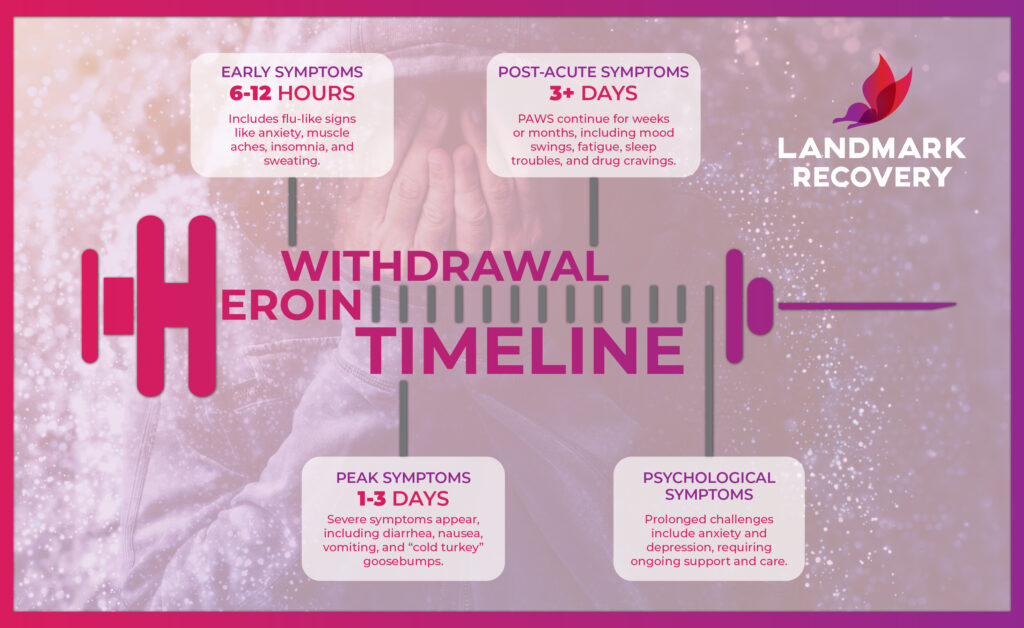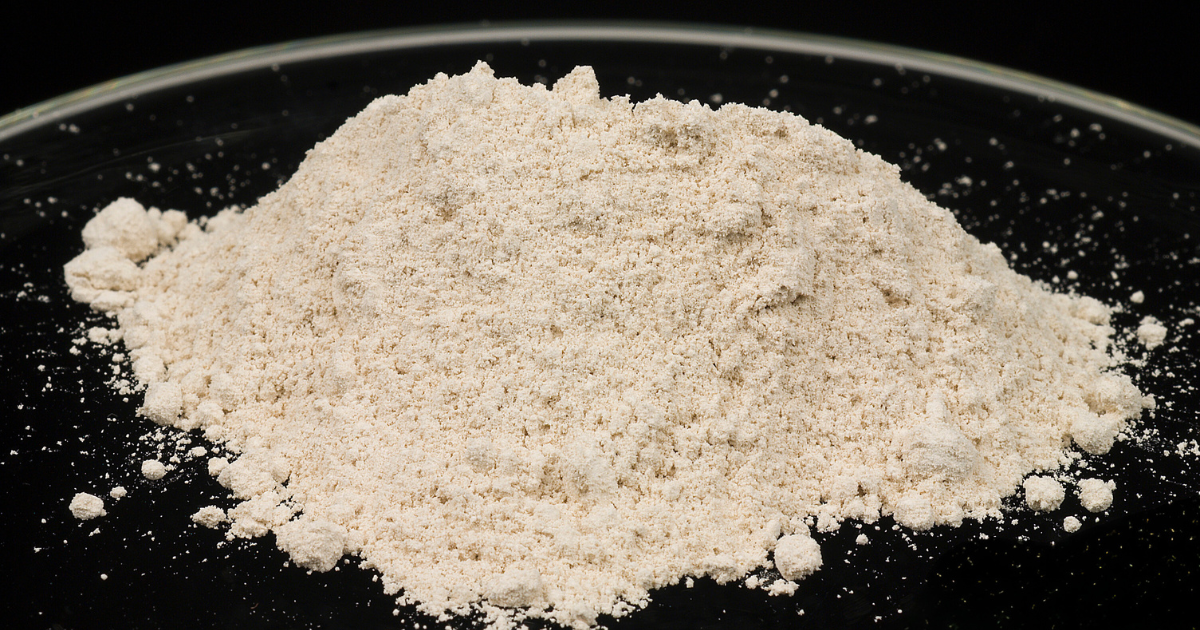For most individuals, heroin can be detected for 1 to 3 days after the last dose. But, individual metabolism, overall health, the quantity and quality of the drug used, and the frequency of use can cause this timeframe to vary.
Understanding how long your system retains heroin is critical to the recovery process. We at Landmark Recovery want to ensure you have the information you need to safely go through drug detox and embark on your journey toward a life free from substance misuse.
Heroin Detoxification Timeline
After ingestion, heroin, a potent opioid, quickly attaches itself to opioid receptors in the brain, triggering a rush of euphoria, or the ‘high,’ typically associated with its use. The body metabolizes the drug almost instantly, and the high dissipates within a few minutes to a few hours, leaving detectable by-products for a much longer period.
6-12 hours Post-Intake
Within 6 to 12 hours after the last dose, you may start experiencing initial withdrawal symptoms. These can include restlessness, excessive yawning, anxiety, and sweating.
24-72 hours Post-Intake
Heroin and its immediate metabolites typically remain in the bloodstream for approximately 1 to 3 days. Most standard drug tests, such as urine tests, can identify heroin within this period. Individuals also experience the peak of withdrawal symptoms during this time, frequently suffering from nausea, insomnia, and depression.
3-7 days Post-Intake
For most individuals, withdrawal symptoms start to decrease after the first week. However, drug tests can detect the drug in hair for up to 3 months or more.
Factors Influencing Heroin Detection Times
The exact length of heroin stays in your system can vary significantly depending on several factors. Let’s talk about three in particular:
- Individual Metabolism and Health
- Frequency and Amount of Heroin Use
- Quality of the Drug
Individual Metabolism and Health
The individual’s metabolism and overall health significantly affect how quickly heroin is processed and eliminated. Age, weight, liver health, and hydration levels can all influence how long heroin stays in your system.
Frequency and Amount of Heroin Use
The frequency and amount of heroin use can also significantly influence how long the drug stays in your system. Chronic and heavy heroin users may have the drug in their system longer than occasional users.
Quality of the Drug
The quality and purity of the heroin used can also impact detection times. Higher-purity heroin will be metabolized and eliminated faster than adulterated heroin, which may contain other substances that can linger in the system.

What is Heroin Withdrawal Like?
Heroin withdrawal is a physically and emotionally challenging process that occurs when an individual who has developed a dependence on heroin abruptly stops or reduces the intake of the drug. The body, having adjusted to the presence of heroin, reacts with an array of symptoms that can be extremely uncomfortable and even life-threatening.
- Early Symptoms (6-12 hours): Initial withdrawal symptoms often mimic the flu, and may include excessive yawning, anxiety, agitation, muscle aches, increased tearing, insomnia, runny nose, and sweating.
- Peak Symptoms (1-3 days): After the first day, more severe symptoms begin to manifest, such as diarrhea, abdominal cramping, nausea, and vomiting. The individual may also experience goosebumps, where the term “cold turkey” originates.
- Post-Acute Symptoms (after 3 days): Although the most intense symptoms usually subside after the first week, post-acute withdrawal symptoms, or PAWS, can continue for weeks or even months. These may include mood swings, anxiety, fatigue, trouble with sleep, and a strong craving for the drug.
- Psychological Symptoms: Alongside the physical withdrawal symptoms, psychological distress, including anxiety and depression, can be particularly challenging to manage. These psychological symptoms can persist long after the physical symptoms have abated, necessitating continued psychological support and care.
Due to the severity of these symptoms, seeking professional help during heroin withdrawal is strongly recommended. Don’t quit cold turkey and expect an easy detox. Medical professionals can provide necessary support and interventions to manage these symptoms and prevent potential complications.
Read our article about Matty Healy’s successful recovery from heroin addiction.
Starting Your Recovery Journey
Knowing how long heroin stays in your system is the first step in understanding the detoxification process and the importance of medical supervision during this period. Withdrawal symptoms can be severe and sometimes life-threatening, making it critical to seek professional help when deciding to stop using heroin.
We at Landmark Recovery provide medical detox services to ensure your safety and comfort during the early stages of your recovery journey. Our team of medical professionals has training in managing withdrawal symptoms and providing comprehensive support throughout the process.
If you or a loved one is struggling with heroin use, it’s never too late to seek help. Landmark Recovery is here to guide you every step of the way on your journey to recovery. Call us today at 888-448-0302 to learn more about our treatment options and how we can support you in achieving a heroin-free life.

Choose Recovery Over Addiction
We're here 24/7 to help you get the care you need to live life on your terms, without drugs or alcohol. Talk to our recovery specialists today and learn about our integrated treatment programs.




